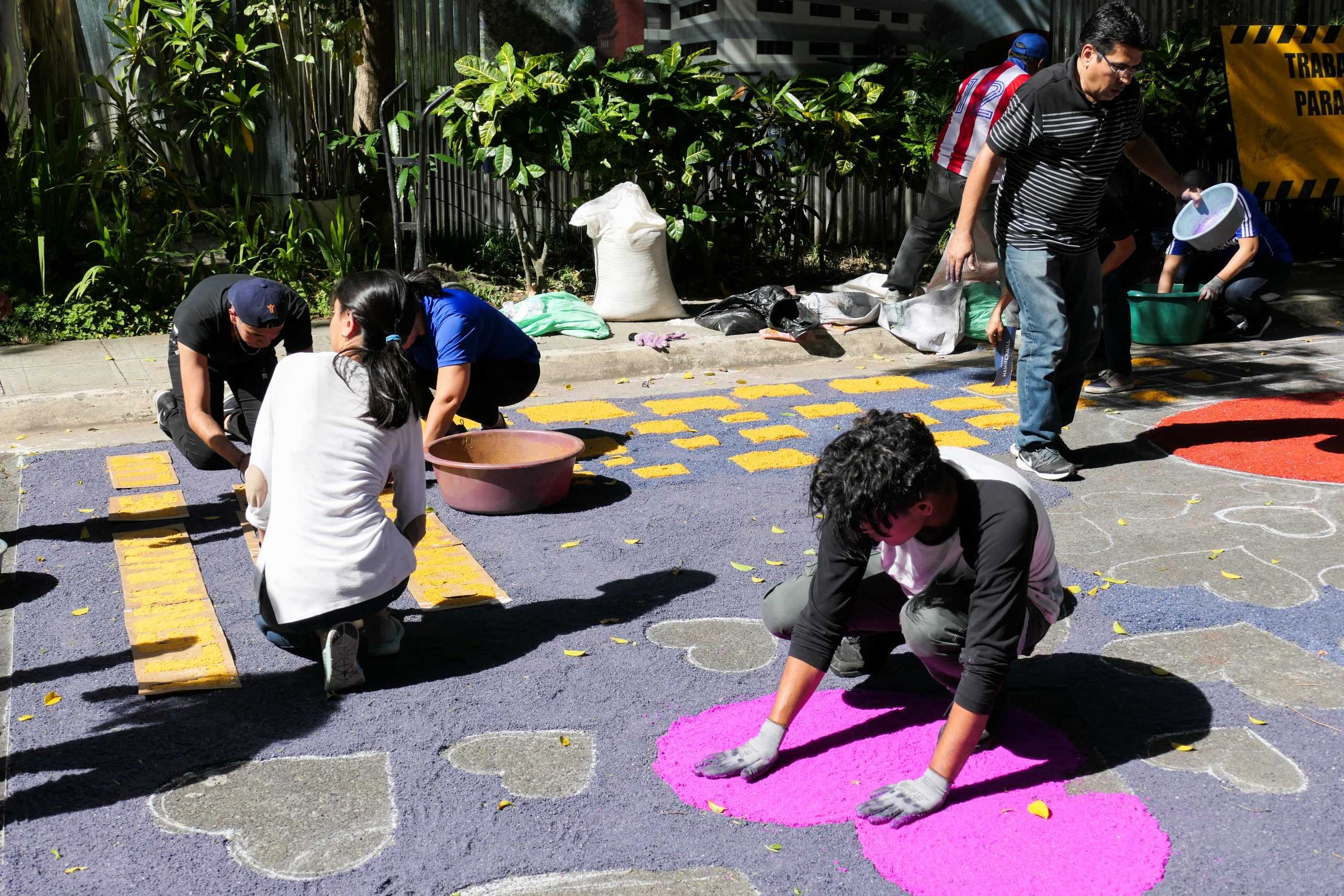Three St. Joe’s students embarked on a five-day service trip to El Salvador last month in honor of the 30th anniversary of the assassination of six Jesuits and two women at the University of Central America (UCA) in San Salvador, El Salvador.
Maddelyn Guerke ’21, Michael Fontana ’20 and Odir Duenas ’20 were chosen by a panel of Campus Ministry staff to participate in the trip. Joining the students were three Jesuits from St. Joe’s, Bill Rickle, S.J., Peter Clark, S.J. and Brendan Lally, S.J., as well as Richard Gioioso, Ph.D., assistant professor of political science and director of the Latin America and Latinx studies program.
“Sincerity and dignity,” Duenas said. “I’ve been reiterating this to everybody who has asked me about the trip.”
Duenas, whose family is from El Salvador, had family members involved in the civil war that resulted in the assassination of the six Jesuits and two women.
During the trip, Fontana said the St. Joe’s delegation learned more about the civil war that facilitated the assassination.
“It was a political power fight,” Fontana said. “The people were being suppressed, and they had had enough and were fighting for job rights, and working opportunities. The Jesuits were very highly supportive of the force movement.”
Rickle knew two of the Jesuit martyrs–Ignacio Martín-Baró and Ignacio Ellacuría Beascoechea–on a personal level.
“[Ellacuría] was the principal target. There’s no doubt about it,” Rickle said. “He had been actively engaged with getting the two warring parties to sit down at the table and negotiate a peaceful settlement. The hypothesis is that the military did not want that, and that’s why they were killed.”
Although it has never been proven, then El Salvador president, Alfredo Cristiani, likely issued the military commands to assassinate the Jesuits, Rickle said.
At the recent commemoration, the St. Joe’s delegation joined other delegations from Jesuit universities across the U.S. and Central America to celebrate the lives of the martyrs.
“Thousands of people were celebrating mass, with hundreds of Jesuits on the podium saying mass in different languages,” Fontana said. “It was insane.”

While the student delegates from St. Joe’s said the celebration was a great experience. They also said they gained understanding from service they did while there about how the Jesuits approach justice and peace.
“I think what these martyrs really taught us is that if you truly want to help someone, you must live through them and live with them,” Duenas said. “These people, for one, totally immersed themselves into the conflict and difficulty that the people they wanted to help were going through, which was oppression, massive violence and genocide.”
Rickle said he witnessed this behavior even before the civil war.
“Virtually all of those men were university professors,” Rickle said. “But on the weekends they were out in the villages and in parishes holding mass, being with people and doing pastoral work.”
While in El Salvador, the group from St. Joe’s took a trip to interact with a community experiencing poverty on the side of a volcano. The group learned about two college students from the UCA El Salvador who visited the community twice a week, assisting single mothers there.
Fontanta said the students’ interactions are the epitome of “relational service.”
“It was the body language to me that really signified that they lived and had a deep connection with these people who they really didn’t know at the beginning of the semester,” Fontana said. “They really leaned on each other. I thought that was really significant, the single mother [able] to lean on the student for camaraderie and support and whatever she needed at the time.”
Fontana, who had participated in immersion trips in the past, was taken aback by this form of service.
“I never had this ‘ah-ha’ moment that ‘this is solidarity’ until I was sitting there listening to their stories and watching them interact with their families,” Fontana said.
Relational service is not new to Duenas, who has been involved in this type of service since a young age.
Every Easter, while living in Southern California, Duenas said he and his family would drive to Tijuana on the Mexican border and hand out bagged lunches to people experiencing poverty.
“My mom would always say, ‘Don’t just give them the lunches, go up to them and talk to them. Ask them about their families, their life,” Duenas said. “Involve yourself in their journey.’”
Even before the El Salvador trip, Duenas said he has noticed short-comings in the way many Americans view service.
“Do we really care about those we are serving?” Duenas said. “Or do we just do it to put it on a resume or to get enough points to go to formal? Or do we do it just to take a picture with a brown kid like it’s a petting zoo?”
The UCA El Salvador students who helped guide the St. Joe’s delegation in El Salvador, according to Duenas, were a great example of caring about those they serve and a true representation of a Jesuit education.
“Their service and dedication to their community are not expressed through posters, announcements or any type of marketing, but is expressed through intensity and going the ‘extra mile’ for others,” Duenas said.

















































